POLITICS
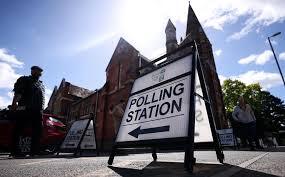
The UK General Election - 4 July 2024
By The History Man
Thursday 4th July, 2024
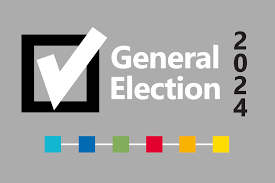
Also Independence Day in the USA, today is the date of the British General Election. Opinion Polls have been telling us for weeks that the Labour Party, led by Sir Keir Starmer, will win with a massive majority, possibly sending the Conservative Party into oblivion. If, the Reform Party, previously UKIP, led once again by Nigel Farage, takes votes from disgruntled Tories, it looks even worse for the governing party, led by Rishi Sunak, the party’s fifth leader in 14 years.
Since David (now Lord) Cameron foolishly agreed to hold a simple yes/no referendum on leaving the European Union, the party and its several governments has failed on so many fronts, that many Tory MPs will surely be relieved to no longer be in government, when they lose their “safe” seats today. Some have already announced that they are standing down, in order to avoid the embarrassment of defeat at the poll.
Thursday 4 July 2024, 11.00 pm
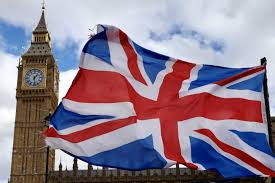
Polling stations in the UK have just closed. The official exit poll predicts a landslide for the Labour Party. Labour 410; Conservative 131; Liberal Democrats 61; Reform 13; SNP 10; Greens 2; others 23.
This is only a poll based on 130 constituencies, yet in the last five general elections, the exit poll has been uncannily accurate.
I’ve just got myself an ice-cream and am going to settle down to watch the first actual results come in ….. More later …..
Thursday 5 July 2024, 05.00 am
It’s six hours since polling stations closed, and the count started.
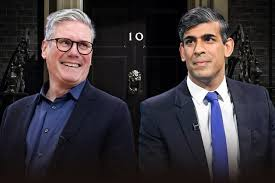
The state of play, at 05.45 am, as Rishi Sunak retains his seat, with 436 out of 650 results declared, is Labour 308; Conservative 67; Liberal Democrats 40; Reform 4; Green 4; others 14.
The Tories have lost a record 11 cabinet ministers namely Alex Chalk, Therese Coffey, David Davies, Oliver Dowden, Liam Fox, Gillian Keegan, Brandon Lewis, Johnny Mercer, Penny Mordaunt, Jacob Rees-Mogg, Grant Shapps.
I’m going to take a break – I need a cuppa and an early breakfast …..
Friday 5 July 2024, 06.00 am - Labour wins the 2024 General Election
In the short time I was away in the kitchen Labour achieved the 326 seats it needed to win the election. Sir Keir Starmer is the new Prime Minister.

Friday 5 July 2024, 06.30 am
With results in from 550 seats – 100 to go – Labour has 373; Conservatives 91; Liberal Democrats 51; Reform 6; Green 5; others 24. Friday 5 July 2024, 07.30 am
Labour reach 400 seats with just 34 still to declare.
Bye for now!
© The History Man
Sources:
Cornish Times
El Periodico
France 24
Google Imagenes
Independent
Reuters
SKY News "Election Night"
Wikipedia
Tags:
Alex Chalk, Brandon Lewis, Conservative, David Davies, general election, Gillian Keegan, Grant Shapps, Greens, Jacob Rees-Mogg, Johnny Mercer,Keir Starmer, Labour, Liam Fox, Liberal Democrat, Oliver Dowden, opinion poll, Penny Mordaunt, Reform, Rishi Sunak, SNP, Therese Coffey, vote, voting,
***
By The History Man
The 2023 Spanish general election was held on Sunday, 23 July 2023, the date known in Spain as 23J, to elect the 15th Cortes Generales of the Kingdom of Spain.
All 350 seats in the Congress of Deputies were up for election, as well as 208 of 265 seats in the Senate.
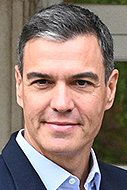
The second government of Pedro Sánchez formed after the November 2019 Spanish general election consisted of a left-wing coalition between the Spanish Socialist Workers' Party (PSOE) and Unidas Podemos, the country's first such nationwide government since the times of the Second Spanish Republic.
The government's tenure was quickly overshadowed by the outbreak of the COVID-19 pandemic in March 2020, along with its political and economic consequences. These consequences included the COVID-19 recession resulting from the extensive COVID-19 lockdowns implemented to curb the spread of the SARS-CoV-2 virus, as well as the economic impact of the Russian invasion of Ukraine.
On the right side of the political spectrum, the People's Party (PP) underwent a leadership change at the 20th National Congress of the PP in February 2022, Alberto Núñez Feijóo replaced party leader Pablo Casado.
Since Feijóo's accession, the PP led opinion polls and finished first in the regional and local elections of 28 May 2023.
Far-right Vox has been open to support the PP in a hung parliament in exchange for government participation and programmatic concessions. Despite speculation about an early election, Pedro Sánchez, the incumbent prime minister of Spain, consistently expressed his intention to complete the legislature as scheduled in 2023.
He had initially set a tentative election date for December 2023, near the conclusion of the Spanish presidency of the Council of the European Union. However, the poor results of the left-wing bloc in the May 2023 regional and local elections, with losses to the PP and Vox in all but three regions, led to a surprise early dissolution of Parliament in what was described as a gamble by Sánchez to wrong-foot the opposition.
In the closest election since 1996, the PP saw the biggest increase in support and secured 137 seats in the Congress, but fell short of expectations which had placed it at around 150 to 160 seats.
The PSOE placed second and overperformed polls by improving upon previous results, gaining over 1 million votes and scoring its best result since 2008 in terms of votes and vote share.
Vox saw a decrease in its popular vote and seats, while Sumar won 31 seats in the Congress, a decrease in the popular vote and seats of its constituent parties.
Neither bloc achieved a majority and, despite losses among Catalan independence parties, the balance of power was held by the Together for Catalonia (Junts) party of former Catalan president and fugitive Carles Puigdemont.
Following a failed attempt by Feijóo to secure investiture, Sánchez struck a deal with Junts and most of the parliamentary regionalist and peripheral nationalist parties, virtually ensuring his re-election in the first ballot of investiture scheduled for 16 November.
With thanks to Wikipedia
Copyright: The History Man


